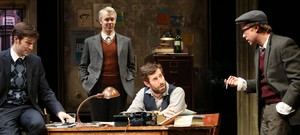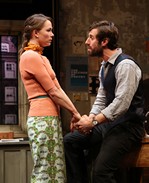A CurtainUp Review
The Common Pursuit
Additional Comments By Elyse Sommer
|
What we need to talk about now isn't simply what we want for our first few issues but our whole future. — Stuart
|

L-R:J acob Fishel, Tim McGeever, Josh Cooke Lucas Near-Verbrugghe
(Photo credit: Joan Marcus) |

Josh Cooke and Kristen Bush (Photo credit: )
|
Here is an organically consolidated a bunch of litterateurs as has ever been bonded together in one play. These chaps and one woman, Stuart Thorne (Josh Cooke), Marigold Watson (Kristen Bush), Martin Musgrove (Jacob Fishel), Humphry Taylor (Tim McGeever), Nick Finchling (Lucas Near-Verbrugghe), Peter Whetworth (Kieran Campion), soon enough find out that collaborating on the publication of a literary journal is apt to take its toll on long-standing friendships and more intimate personal relationships.
The play chronicles twenty years during which time we watch with the relish of privileged voyeurs how the emotional detours, the academic pitfalls and the whims of providence alter the professional and private lives of these somewhat arrogant, but also engagingly emboldened intellectuals. Cheers for director Moisés Kaufman (Bengal Tiger at the Baghdad Zoo, 33 Variations, and I Am My Own Wife) who has unequivocally embraced the play's inherent Anglomania, an effort that pays off handsomely given the supportive élan and esprit of the company.
Cooke is an immediately recognizable specimen of becalmed stress, the organizer of the proposed journal, to be called The Common Pursuit. He hopes to be as fulfilled at work as he is in his love for resilient Marigold, as played by a casually sensual Kristen Bush. Eventually becoming Stuart's wife, Marigold is also an unwitting catalyst for some major upheavals.
As Martin the money-bags sponsor of the project, Jacob Fishel projects a fresh-faced innocence that expresses the character's utter lack of sophistication, all the while changing effortlessly from a Casper Milquetoast to a big cheese. Campion is very fine as Peter, the good-looking, self-assured historian whose negotiating skills in the business sector are as slickly deployed as is his compulsive womanizing in the private arena. McGeever is excellent as Humphry, the dour, pompous, condescending philosopher/poet, and most detrimentally a promiscuous homosexual. Near-Verbrugghe has the most show-offy role as Nick, the caustically boorish, deviously self-serving critic. Near-Verbrugghe makes the most of his and his character's opportunities to command attention, consigned as he is to prolonged coughing fits, chain-smoking, and generally being conspicuously unnerving and unsettling to the others.
The fluctuating allegiances, surprising betrayals and the ultimately happy/sad resolutions are all served well by a playwright who makes no apology for what is apparently an incomparable affection for his characters. There is not a dull moment in this play which relies as heavily on the brashness of its characters as well as on the brightness of its discourse. It is also well marked with spicy, riveting contrivances that generally act as palate fresheners in an already sumptuous feast. Bitter-sweetly book-ended by scenes in Stuart's cluttered room at Cambridge, designer Derek McLane unpretentiously evocative settings mainly include the publishing offices in Holborn.
Unquestionably standing right alongside Gray's other acclaimed forays into his favored world of academia, this sparking production will undoubtedly please fans of the late Gray. It will also allow those yet unacquainted see just how uncommon is The Common Pursuit.
|
Additional Comments by Elyse Sommer Today's college graduates, no matter on which side of the Atlantic, are unlikely to have the option of getting tenured college jobs, becoming book editors and publishers. They could blog but it would take more than a modest grant or the support of a single well-heeled sponsor like The Common Pursuit's Martin. So in terms of representing a zeitgeist with which a theater goer of the younger generation can easily identify with, Simon Gray's 1984 play is dated. On the other hand, there's a never dated universality to the 20-year trajectory of Gray's five Cambridge men and one woman. Like many bright students in the middle of their college years, life still lies before them as an inviting blank book. In the years that follow the pages are filled in and eventually culminated by the realization that mistakes (personal and professional) were made that can't be unmade. The Common Pursuit is also something of an antique in that it's the sort of well-constructed full-bodied play alive with pungent dialogue rarely done these days. It makes one wish that contemporary British novelists like Julian Cartwright also followed Simon Gray's career path, writing plays as well as novels. (In fact, being a prolific multi-media author did not prevent Gray from continuing his career as a university lecturer which provided him with a keen knowledge of the university life he portrayed in many of his plays). In the meantime I join my trusty colleague in recommending that you take the opportunity to have a look at a by-gone generation of bright young university students as a means to reflect on the way youthful hopes, ideals and loves tend to turn into might-have-beens. Since The Common Pursuit is essentially a play about the words (the title comes from the works about poetry by FR Leavis, the academic and literary critic FR Leavis, who influenced and probably taught the play's characters) I'll just add some of my favorite bits of dialogue to Simon's review. As a writer and someone laboring in the vineyards of book publishing for many years I loved the pragmatic Martin's explaining that he wants to start his own publishing business because the house where he's doing well as an editor is publishing books where "even the titles are ungrammatical." But favorites lines come from the acerbic Humphry, the play's poet-philosopher who declares that he's given up poetry because it makes him feel sick, and plans to get a job at Cambridge that's the only way to be a professional philosopher. His reason for picking the school that will be his alma mater: "If I'm going to institutionalize myself, I suppose I might as well do it in one of the better institutions." While Humphry isn't the only one to warn the chain smoking, wracked with coughs Nick to give up his tobacco habit, the warning that sticks to memory is his "That's aesthetically one of the least attractive ways of killing yourself, Nicholas, why don't you stop it?" Mr. Gray, like Nicholas ignored all warnings to end his 60-year habit and was already under a death sentence from lung cancer, when he was felled by an aneurysm four years ago. Among insults to savor, there's Humphry's devastating putdown of Peter's writing career and compulsive womanizing: "You go on spawning children and pretending to love a fatuous wife that you can't even be bothered to betray competently, while writing books on subjects that you inevitably demean." Humphry also points his verbal dagger at the shifty Nick, declaring Nick's insincere talk about how he'd like to live the life of a vicar to be a quite suitable career for him: "He has some of the right qualification. He lies badly about things that don't matter." Humphry is also the play's most astute observer and recognizes the paralells between his and the less complex Martin's seemingly different as night and day private lives. Of course, ultimately the person Humphry sadly likes the least is himself. Simon Gray plays reviewed at Curtainup Butley a 2006 Broadway revival starring Nathan Lane who played Peter in the 1986 production of The Common Pursuit at the defunct Off-Broadway Promenade Theater Quartermaine's Terms, one of my favorite Gray plays given a lovely production at the Williamstown Theatre Festival three summers ago. Our London critic, Lizzie Loveridge reviewed a revival of The Common Pursuit in 2009; also The Last Cigarette with Hugh Whitemore in 2008. And our Connecticut critic caught up with one of his last plays The Old Masters in 2011 |
|
The Common Pursuit By Simon Gray Directed by Moisés Kaufman Cast: Josh Cooke (Stuart Thorne), Kristen Bush (Marigold Watson), Jacob Fishel (Martin Musgrove), Tim McGeever (Humphry Taylor), Lucas Near-Verbrugghe (Nick Finchling), Kieran Campion (Peter Whetworth) Set Design: Derek McLane Costume Design: Clint Ramos Lighting Design: David Lander Original Music & Sound Design: Daniel Kluger Running Time: 2 hours 20 minutes including intermission Roundabout at Laura Pels Theatre, 111 West 46th Street (212) 719 – 1300 Tickets: $71.00 - $81.00 Performances: Tuesday through Saturday evening at 7:30 p.m. with Wednesday, Saturday and Sunday matinees at 2:00 p.m. From: 05/04/12 Opened: 05/24/12 Ends: 07/29/12 Review by Simon Saltzman based on performance 05/17/12 |
|
REVIEW FEEDBACK Highlight one of the responses below and click "copy" or"CTRL+C"
Paste the highlighted text into the subject line (CTRL+ V): Feel free to add detailed comments in the body of the email. . .also the names and emails of any friends to whom you'd like us to forward a copy of this review. Visit Curtainup's Blog Annex For a feed to reviews and features as they are posted add http://curtainupnewlinks.blogspot.com to your reader Curtainup at Facebook . . . Curtainup at Twitter Subscribe to our FREE email updates: E-mail: esommer@curtainup.comesommer@curtainup.com put SUBSCRIBE CURTAINUP EMAIL UPDATE in the subject line and your full name and email address in the body of the message. If you can spare a minute, tell us how you came to CurtainUp and from what part of the country. |

Slings & Arrows- view 1st episode free
 Anything Goes Cast Recording
Anything Goes Cast RecordingOur review of the show
 Book of Mormon -CD
Book of Mormon -CDOur review of the show

